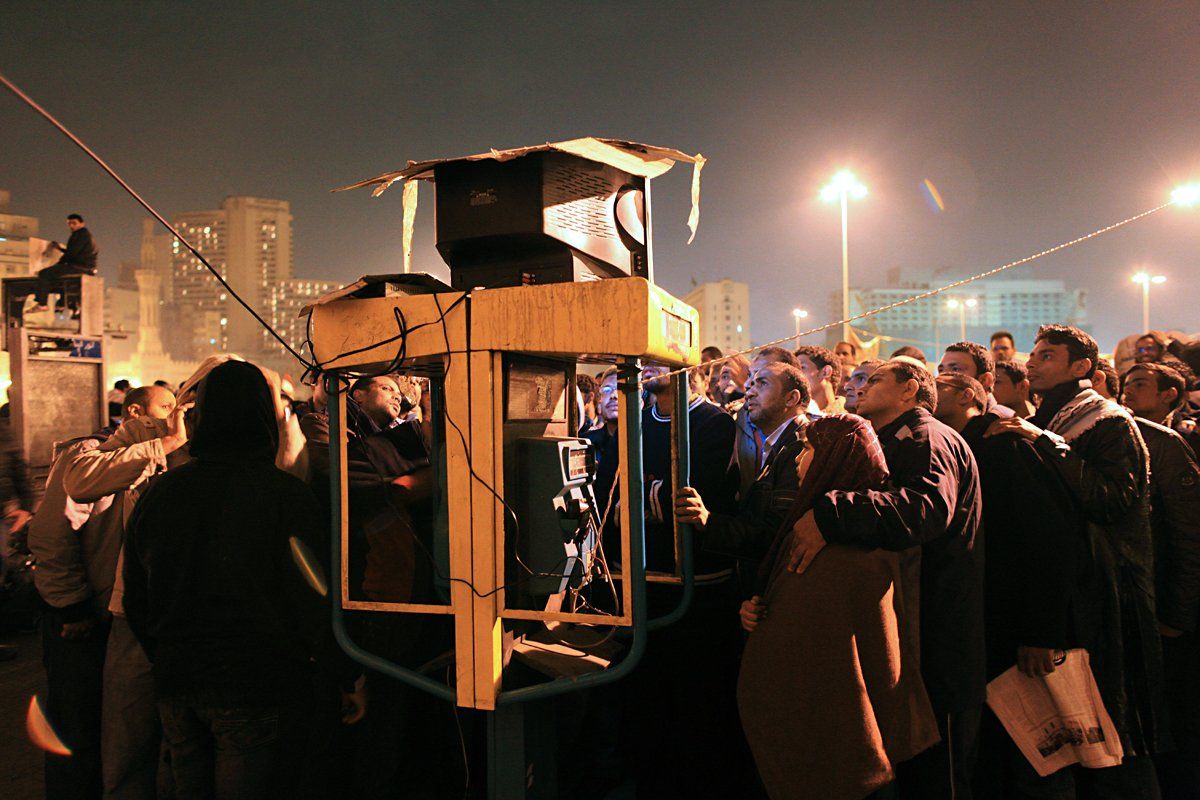
As I write, a ticker flashes across my screen reporting that our Cairo bureau has been stormed, our offices closed, and our equipment confiscated. It's another hurdle in a fast-growing list of obstacles to prevent Al Jazeera's coverage in Egypt, where we have more reporters, cameras, and citizens' feeds on the ground than any other international network.
On Thursday three of our journalists were arrested. The next morning one of our websites was hacked. All week the Egyptian government-owned satellite company Nilesat blocked our broadcast signal.
Undeterred, our teams fanned out across the country. Braving the same violent pro-government attacks waged on demonstrators, Al Jazeera journalists took their cameras to the streets of Cairo, Suez, Alexandria, and Malhalla to capture the dramatic scenes of thousands of everyday Egyptians struggling for greater representation. In parallel, scores of citizens equipped with mobile phones, Twitter, and Facebook fed us real-time images and updates from the street. Social-media platforms have become an integral part of our coverage. The regime's response? It turned the Internet off, too. There's no doubt about intent: Cairo wants to deny our ability to inform the world of these remarkable events as they unfold.
Staring down governments that want to monopolize information in the Arab world, however, is hardly new to Al Jazeera. At this moment, though, I question whether this is exactly what has also happened to Al Jazeera English in America. There, too, we are almost completely shut out.
That's quite concerning, as the U.S. media market rests on sturdy democratic principles, namely the First Amendment and the freedom of expression. But ever since Al Jazeera's English channel first sought to broadcast in the States, roadblocks have marked every turn.
In the late 1990s, Al Jazeera's Arabic channel emerged as a transformational force in the Middle East. It gave a voice to the Arab street: intellectuals and marginalized political opposition were heard, in many cases, for the first time. A free press may be a familiar reality in the West, but where I live the concept of an independent news channel was truly revolutionary.
Soon after, the Bush administration was intent on promoting democracy across the Middle East. But as it waged wars in Iraq and Afghanistan, it also sought to filter the information flowing to the American people. Washington's "with us or against us" mentality, regrettably, quickly demonized Al Jazeera for daring to provide alternative viewpoints on wars that had, to put it bluntly, been sanitized for American audiences. Already famous in the Middle East for telling both sides of the story, Al Jazeera was not about to compromise its professional standards and ignore the human realities of war on the ground.
What stunned us then, as it does today, is the insistence by U.S. operators that Americans are not interested. From a commercial standpoint, they argued, Al Jazeera was not worth their precious bandwidth. Our figures prove otherwise. In recent days, our online viewership has spiked by 2,500 percent. And more than half of those eyeballs are coming from the U.S.!
We are unique because our reporters understand the social, political, and historical fabric of the societies they cover. They speak the language. They know the terrain. This makes our news distinctive. It is journalism with depth. So it's mind-boggling that Al Jazeera cannot share that valuable work in a land that prides itself on a free press.
But in the end the truth finds a way. Ironically, like the people on the streets of Egypt, Tunisia, Lebanon, and Sudan, the people of America, too, have been defying limits. They've adapted, watching our live streams online and our YouTube channel. They're spreading our headlines virally across social media. A new age of journalism is emerging, and we are succeeding by empowering a new generation of reporters to thrive in it. It's a wonder the West's most powerful country doesn't get to watch.
Khanfar is director-general of the Al Jazeera network, which is based in Doha, Qatar.
For a discussion of Al Jazeera's coverage join Al Jazeera English's senior political analyst, Marwan Bishara as he hosts "Empire," at Columbia University's School of Journalism in New York City, Friday February 11th at 3pm EST
Uncommon Knowledge
Newsweek is committed to challenging conventional wisdom and finding connections in the search for common ground.
Newsweek is committed to challenging conventional wisdom and finding connections in the search for common ground.
About the writer
To read how Newsweek uses AI as a newsroom tool, Click here.








